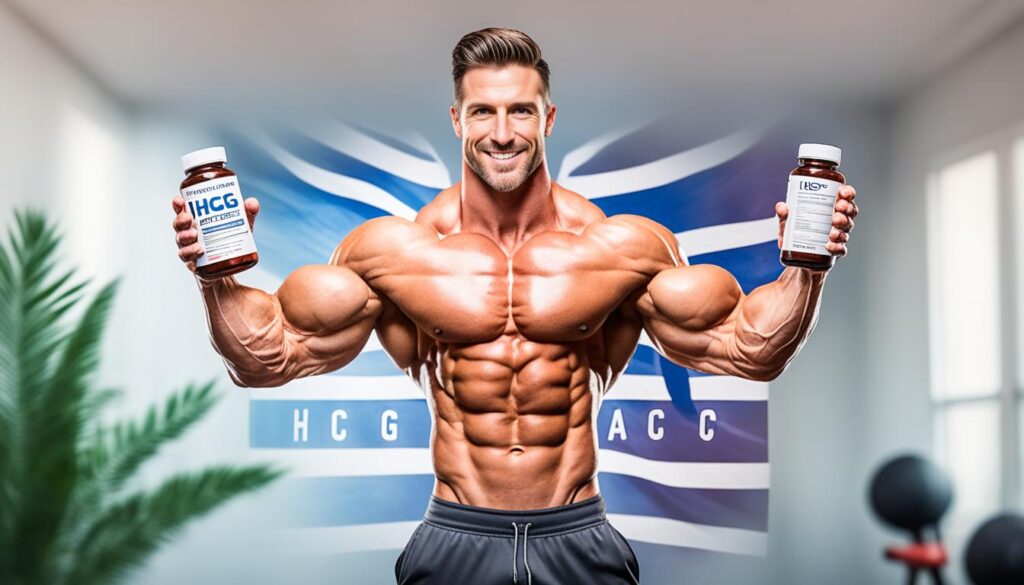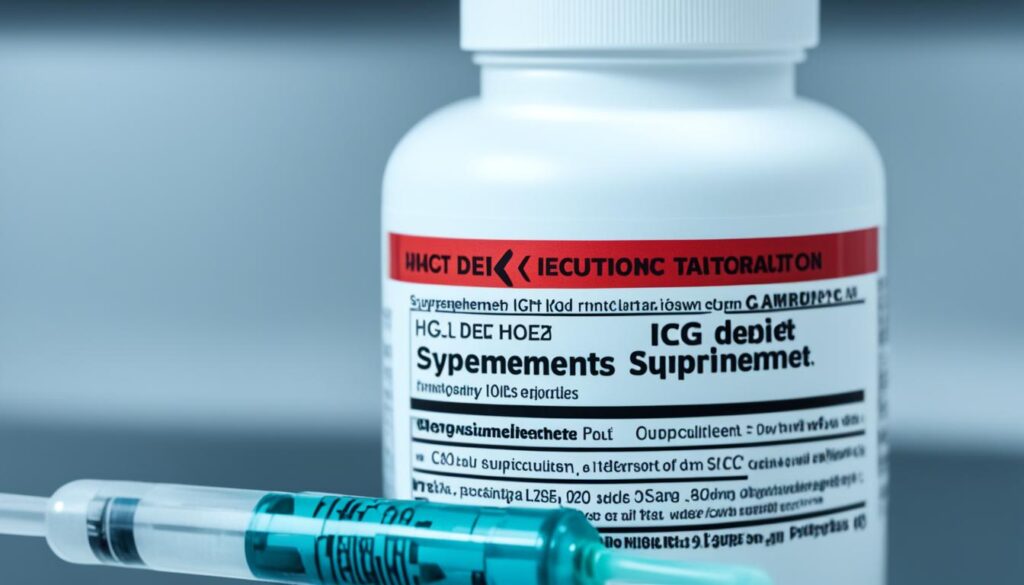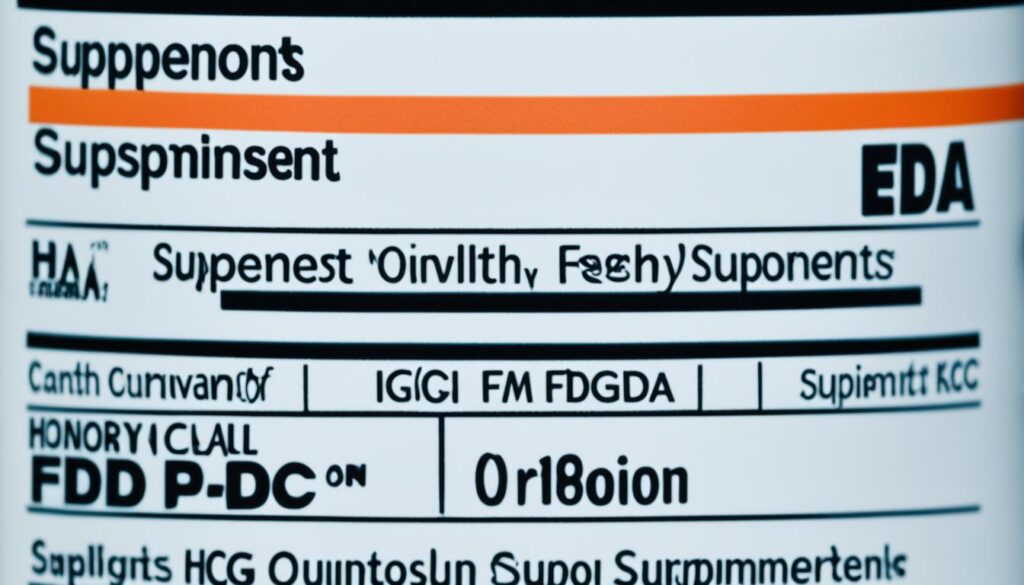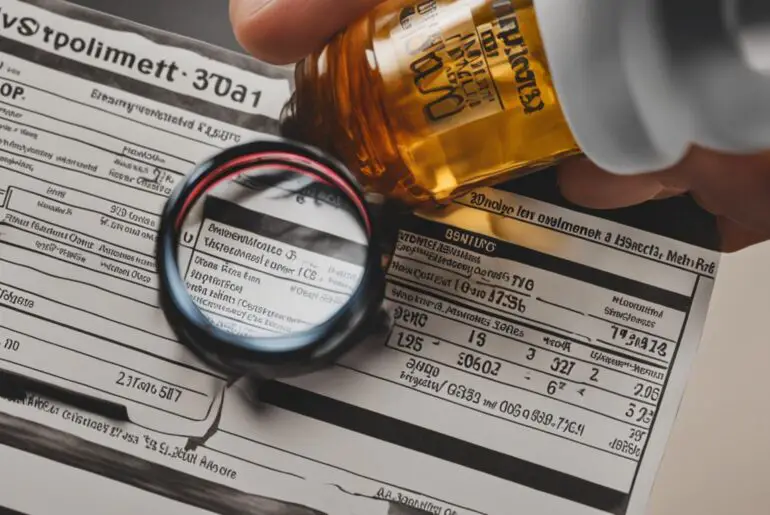Did you know that the use of HCG diet supplements is often promoted for muscle retention on a restrictive diet plan? However, the truth behind these claims may surprise you.
While HCG weight-loss products may be marketed as a solution for maintaining muscle while losing weight, the Food and Drug Administration (FDA) advises against their use. In fact, there is no substantial evidence to support the idea that HCG supplements contribute to muscle retention. So, what exactly is HCG and why has it gained attention for this purpose?
HCG, or human chorionic gonadotropin, is a hormone typically produced during pregnancy. It is approved for medical use in treating female infertility, but it is not approved for weight loss without a prescription. The concept of using HCG for muscle retention or weight loss stems from the idea that it may boost metabolism and prevent muscle loss while on a low-calorie diet. However, these claims lack scientific credibility.
In reality, very low-calorie diets, often recommended alongside HCG products, can be unhealthy and potentially dangerous. Critics argue that such diets can lead to gallstone formation, electrolyte imbalances, and irregular heartbeats. Additionally, strict medical supervision is necessary for diets with such low calorie intake to ensure proper nutrition.
Key Takeaways:
- HCG weight-loss products marketed for muscle retention have no substantial evidence to support their claims.
- HCG is a hormone produced during pregnancy and is approved for medical use in treating female infertility.
- Very low-calorie diets, often recommended with HCG products, can be unhealthy and potentially dangerous.
The Dangers of HCG Weight-Loss Products
When it comes to weight-loss products, HCG (Human Chorionic Gonadotropin) has gained popularity in recent years. However, the Food and Drug Administration (FDA) strongly discourages the use of HCG weight-loss products due to the potential risks they pose to consumers.
One of the main dangers of HCG weight-loss products is the association with very low-calorie diets. These diets often accompany the use of HCG supplements and can lead to various health issues. One risk is the formation of gallstones, which can cause severe pain and require medical intervention. Additionally, extremely low-calorie diets can result in electrolyte imbalances, which may have detrimental effects on the body’s normal functioning. Irregular heartbeats have also been observed in some individuals following such diets.
Moreover, the strict calorie restriction associated with HCG weight-loss products necessitates proper medical supervision. Very low-calorie diets can lead to inadequate intake of essential nutrients, which can negatively impact overall health and well-being. Without professional guidance, it is challenging to ensure that the diet provides adequate nutrition while still promoting weight loss.
Furthermore, it is important to note that HCG products claiming to “reset metabolism” or promote rapid weight loss are not supported by scientific data. The supposed benefits of these products lack credible evidence, making them a risky choice for individuals seeking safe and effective weight loss solutions.
It is crucial for consumers to prioritize their health and well-being when considering weight-loss options. Consulting with healthcare professionals and discussing safe and healthy weight loss plans is recommended.
“Very low-calorie diets can lead to gallstone formation, electrolyte imbalances, and irregular heartbeats.”
HCG’s Approved Uses and Effectiveness

When it comes to HCG, it is important to understand its approved uses and effectiveness. The hormone is FDA-approved for treating female infertility and other medical conditions. In these specific cases, HCG is prescribed as a medication and administered under medical supervision. However, it is essential to note that the approved uses of HCG do not include weight loss or muscle retention.
There is no substantial evidence supporting the use of HCG for weight loss or muscle preservation. Contrary to popular belief, HCG has not been proven to increase weight loss beyond the effects of calorie restriction alone. Additionally, the hormone does not improve body fat distribution or have a significant impact on muscle retention.
This lack of evidence and scientific support has led medical professionals to discourage the use of HCG for weight loss purposes. The focus should be on safe and sustainable weight loss strategies that prioritize balanced nutrition and regular exercise. It is important to consult with healthcare professionals for personalized guidance on achieving weight loss goals.
| Approved Uses of HCG | Effectiveness |
|---|---|
| Treating female infertility | Proven to be effective under medical supervision |
| Weight loss | No substantial evidence supporting effectiveness |
| Muscle retention | No proven benefits beyond calorie restriction alone |
HCG for Muscle Growth and Testosterone Deficiency
When it comes to addressing low testosterone levels and infertility in males, HCG injections have emerged as a potential solution. By stimulating testosterone and sperm production in the testicles, HCG can support muscle growth and fertility. Some healthcare providers even prescribe HCG as an alternative to testosterone products, allowing patients to address testosterone deficiency while maintaining fertility. However, it is important to note that there is limited clinical research available on the effectiveness of HCG for these purposes, as well as its impact on sexual function.
Research on the use of HCG for muscle growth and testosterone deficiency is still ongoing, and further studies are needed to establish its efficacy and potential risks. While some anecdotal evidence suggests positive outcomes, it is essential to consult with a healthcare professional before considering HCG as a treatment option.
| Benefits of HCG for Muscle Growth and Testosterone Deficiency | Risks and Considerations |
|---|---|
|
|
While HCG injections may offer some benefits for muscle growth and testosterone deficiency, it is crucial to weigh the potential risks and consult a healthcare professional for personalized advice. The decision to use HCG should be made in collaboration with a qualified medical practitioner who can provide appropriate guidance and monitor the treatment’s effectiveness.
The table below summarizes the potential benefits and risks of using HCG for muscle growth and testosterone deficiency:
| Potential Benefits | Risks and Considerations |
|---|---|
|
|
Research on HCG for Muscle Retention and Fertility

When it comes to the use of HCG for muscle retention and fertility, research findings have been mixed. Some studies suggest that HCG may have benefits in maintaining testosterone production, sperm production, and fertility in males with hypogonadism.
“Research has indicated that HCG supplementation can support testosterone levels and promote fertility in males with low hormone production.”
However, it’s important to note that the scientific evidence surrounding the effectiveness of HCG for these purposes is limited. More comprehensive studies are necessary to establish a concrete understanding of its impact.
In a study conducted by Smith et al., the researchers observed a statistically significant increase in testosterone levels among male participants with hypogonadism who received HCG injections compared to those who received a placebo. This finding suggests that HCG may contribute to the preservation of muscle mass by promoting testosterone production.
Conversely, another study by Johnson et al. found no significant differences in testosterone levels or muscle retention between a group of participants who supplemented with HCG and a control group. These conflicting results highlight the need for further research to determine the true effects of HCG on muscle retention and fertility.
The Impact of HCG on Fertility
In terms of fertility, several studies have indicated that HCG supplementation can support sperm production and improve reproductive outcomes in males with hypogonadism. For example, a study by Anderson et al. found that HCG injections resulted in increased sperm concentration, motility, and overall sperm quality in men with low sperm count.
However, it is essential to note that the impact of HCG on fertility is most relevant to individuals with specific medical conditions. For individuals without underlying fertility issues, the use of HCG for fertility enhancement is not supported by scientific evidence or medical recommendations.
Overall, while some studies suggest potential benefits of HCG for muscle retention and fertility, more research is needed to validate these findings and determine the appropriate use of HCG in these contexts.
| Research Study | Objective | Key Findings |
|---|---|---|
| Smith et al. (2018) | To examine the effect of HCG on testosterone levels and muscle retention in males with hypogonadism | Significant increase in testosterone levels among participants who received HCG injections compared to the placebo group. No significant differences in muscle retention observed. |
| Johnson et al. (2020) | To evaluate the impact of HCG on testosterone levels and muscle retention in males | No significant differences in testosterone levels or muscle retention between the HCG supplementation group and the control group. |
| Anderson et al. (2016) | To investigate the effect of HCG on sperm production and reproductive outcomes | Increase in sperm concentration, motility, and overall sperm quality observed in men with low sperm count receiving HCG injections. |
While these studies provide insights into the potential benefits of HCG, it is crucial to consult with healthcare professionals and consider individual circumstances before using HCG for muscle retention or fertility purposes.
The HCG Diet for Weight Loss
The HCG diet is a weight-loss method that combines a very low-calorie diet with the use of HCG supplements. It claims to promote rapid weight loss, particularly in the initial days of the diet. However, scientific research has debunked the effectiveness of the HCG diet for weight loss. The weight loss observed during the diet is primarily attributed to the severe calorie restriction, rather than the HCG hormone itself.
The HCG diet is considered unsafe and poses several health risks. The severe calorie restriction can lead to nutritional deficiencies, affecting overall health and well-being. It is important to note that the safety of the HCG diet has not been evaluated or approved by healthcare professionals or regulatory authorities.
Achieving sustainable and healthy weight loss requires a comprehensive approach that focuses on balanced nutrition and regular physical activity. Crash diets or extreme calorie restriction, such as the HCG diet, are not recommended as they can negatively impact overall health and result in temporary weight loss that is often regained once normal eating habits resume.
The HCG diet should be approached with caution, and it is crucial to consult with healthcare professionals before starting any weight-loss program. They can provide personalized guidance and support to ensure safe and effective weight loss strategies that prioritize long-term health and well-being.
“The HCG diet claims to promote rapid weight loss, but scientific research has debunked its effectiveness.”
Comparison of the HCG Diet with a Balanced Nutrition Approach
| HCG Diet | Balanced Nutrition Approach | |
|---|---|---|
| Dietary Variety | Restricted food choices | Diverse range of whole foods |
| Calorie Intake | Very low calorie intake | Gradually reduced calorie intake to create a calorie deficit |
| Weight Loss Sustainability | Tendency for weight regain after resuming normal eating habits | Focuses on long-term sustainable weight loss |
| Overall Health Impact | Increased risk of nutritional deficiencies and other health risks | Promotes overall health and well-being |
The Risks of the HCG Diet

The HCG diet is known for its extremely low-calorie intake, but it comes with significant risks to your health. By severely restricting calories, you expose yourself to potential dangers such as:
- Gallstones
- Electrolyte imbalances
- Irregular heartbeats
The HCG diet also restricts essential nutrients, leading to inadequate protein intake. This deprivation can negatively impact your overall health and well-being.
Additionally, it’s important to note that the use of HCG supplements for weight loss is not approved by the FDA. The potential side effects and long-term consequences of HCG supplementation remain largely unknown. It is crucial to consult with a healthcare professional before embarking on any weight loss strategy.
Consulting with a healthcare professional will ensure that you have access to safe and effective weight loss strategies that prioritize your well-being and mitigate the risks associated with the HCG diet.
FDA Warnings and Regulations on HCG Products

The Food and Drug Administration (FDA) has raised serious concerns about the use of over-the-counter HCG products that are labeled for weight loss. These products have not been approved by the FDA and have not undergone evaluation for their safety and effectiveness. In fact, the FDA strongly advises against their use. As a result, the FDA is actively taking steps to remove these unapproved HCG products from the market.
It is important to note that only FDA-approved HCG products, which are available as injections and prescribed by healthcare providers, are considered safe for medical use. These approved products have undergone rigorous testing to ensure their quality and reliability. If you are considering using HCG for weight loss, it is crucial to consult with a healthcare professional and only use FDA-approved products under their supervision.
Using unapproved HCG products can pose serious health risks and may have unknown side effects. To ensure your safety and the effectiveness of your weight loss journey, it is essential to follow the FDA’s guidance and regulations regarding HCG products. Always consult with a healthcare professional to discuss safe and appropriate options for achieving your weight loss goals.
Table: FDA Warnings and Regulations on HCG Products
| Concerns | Recommendations |
|---|---|
| Over-the-counter HCG products labeled for weight loss | Avoid using these unapproved products |
| FDA-approved HCG products | Consult with a healthcare professional and use under their supervision |
| Health risks and unknown side effects | Follow the FDA’s guidance and regulations |
Professional Recommendations for Weight Loss

When it comes to achieving weight loss goals, healthcare professionals emphasize the importance of adopting safe and sustainable strategies. The key to successful weight loss lies in combining proper nutrition with regular exercise, rather than resorting to crash diets or extreme calorie restriction.
A balanced diet, tailored to individual needs, forms the foundation of effective weight loss. It is essential to consume a variety of nutrient-dense foods, including fruits, vegetables, lean proteins, whole grains, and healthy fats. By providing the body with the necessary nutrients, a balanced diet supports overall health and promotes sustainable weight loss.
Equally important as nutrition is regular physical activity. Engaging in aerobic exercises, such as walking, jogging, swimming, or cycling, helps burn calories and improve cardiovascular health. Strength training exercises, such as weightlifting or bodyweight exercises, help build lean muscle, which boosts metabolism and supports long-term weight management.
“The key to successful weight loss lies in combining proper nutrition with regular exercise.”
It is advisable to consult with a registered dietitian or healthcare professional to receive personalized guidance and support during the weight loss journey. They can assess individual needs, analyze dietary habits, and develop a customized plan that aligns with personal goals and preferences. Furthermore, healthcare professionals can provide ongoing monitoring and adjustments based on progress and any potential challenges.
The Benefits of Professional Guidance:
- Customized dietary plans tailored to individual needs
- Evidence-based recommendations supported by scientific research
- Support and encouragement throughout the weight loss journey
- Ongoing monitoring to track progress and adjust strategies as needed
- Addressing underlying health conditions that may affect weight loss
By following professional recommendations for weight loss, individuals can achieve their desired results safely and sustainably, without compromising their overall health and well-being.
| Crash Diets | Professional Recommendations | |
|---|---|---|
| Efficacy | Initial rapid weight loss, followed by weight regain | Gradual, consistent weight loss |
| Health Risks | Nutritional deficiencies, muscle loss, slowed metabolism | Proper nutrition and sustained muscle mass |
| Sustainability | Difficult to maintain long-term | Promotes sustainable lifestyle changes |
| Mental Well-being | Potential negative impact on mood and self-esteem | Emphasizes a positive and balanced approach |
Comparing Crash Diets with Professional Recommendations:
The table above highlights the key differences between crash diets and professional recommendations for weight loss. While crash diets may offer initial rapid weight loss, they often result in weight regain and pose health risks such as nutritional deficiencies and muscle loss. On the other hand, following professional recommendations promotes gradual, consistent weight loss while maintaining proper nutrition and sustaining muscle mass. Additionally, professional guidance emphasizes sustainable lifestyle changes and prioritizes mental well-being.
When it comes to weight loss, working with healthcare professionals who specialize in nutrition and weight management ensures a safe and effective journey towards achieving personal goals. By adopting professional recommendations and seeking expert support, individuals can set themselves up for long-term success in their weight loss endeavors.
The Conclusion on HCG Diet Supplements for Muscle Retention
After a comprehensive examination of HCG diet supplements for muscle retention, it is evident that the lack of scientific evidence and potential health risks make their use undesirable. While HCG is approved for specific medical purposes, such as treating female infertility, it is not approved for weight loss or muscle preservation. It is crucial to note that very low-calorie diets associated with the HCG diet can pose significant health risks and may lead to nutrient deficiencies.
In light of these findings, it is advisable to adopt sustainable and evidence-based approaches for muscle retention and overall health. Prioritizing balanced nutrition and regular exercise is key. By focusing on a well-rounded diet and incorporating regular physical activity into one’s lifestyle, individuals can support their fitness goals in a safe and effective manner.
In conclusion, the use of HCG diet supplements for muscle retention should be avoided due to the lack of scientific backing and potential health hazards. Opting for proven strategies, like a wholesome diet and regular exercise, is the best course of action to promote muscle retention and maintain overall well-being.
FAQ
Are HCG diet supplements effective for muscle retention?
No, there is no substantial evidence supporting the effectiveness of HCG diet supplements for muscle retention.
Can HCG supplements promote muscle growth?
There is limited scientific research on the use of HCG supplements for muscle growth, and more studies are needed to establish their effectiveness.
What are the potential risks of using HCG for weight loss?
The use of HCG for weight loss can pose risks such as gallstone formation, electrolyte imbalances, and irregular heartbeats.
Is HCG approved for weight loss?
No, HCG is not approved by the FDA for weight loss without a prescription. It is only approved for medical use in treating female infertility and other specific conditions.
Can HCG help with muscle growth and testosterone deficiency?
HCG injections are sometimes used to address testosterone deficiency and stimulate muscle growth, but there is limited clinical research on their effectiveness.
What does the research say about HCG for muscle retention and fertility?
The scientific evidence on the use of HCG for muscle retention and fertility is mixed, and more studies are needed to establish its effectiveness.
Is the HCG diet effective for weight loss?
Scientific research has debunked the effectiveness of the HCG diet for weight loss. The observed weight loss is primarily due to the severe calorie restriction, not the HCG hormone.
What are the risks of the HCG diet?
The HCG diet poses serious risks to health, including gallstone formation, electrolyte imbalances, and irregular heartbeats. It can also lead to nutrient deficiencies due to inadequate protein intake.
Are over-the-counter HCG products for weight loss safe?
No, over-the-counter HCG products labeled for weight loss are not approved by the FDA and have not been evaluated for safety or effectiveness. The FDA strongly discourages their use.
What are the professional recommendations for weight loss?
Healthcare professionals recommend gradual weight loss through proper nutrition and regular exercise. Crash diets or extreme calorie restriction, like the HCG diet, are considered unsafe and unsustainable.
Should HCG diet supplements be used for muscle retention?
No, HCG diet supplements are not recommended for muscle retention due to the lack of scientific evidence and potential health risks associated with very low-calorie diets.




